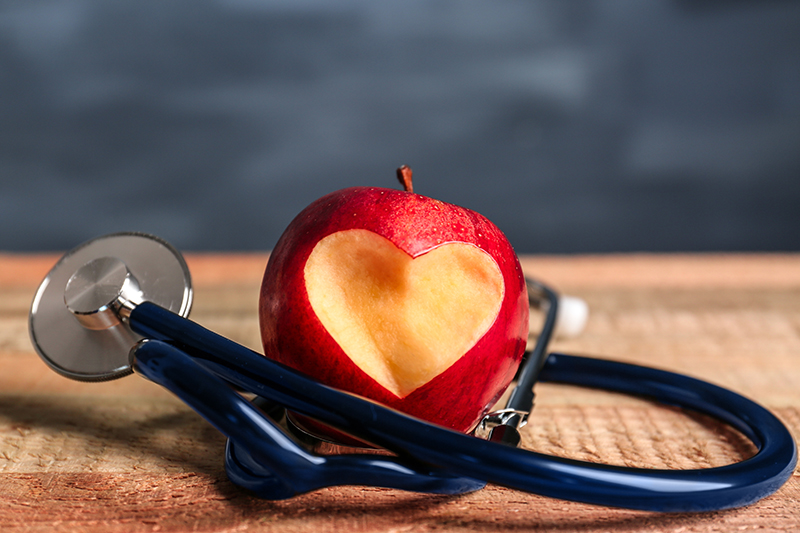5 Steps to Achieve a Healthy Heart

You don’t have to begin a drastic diet in order to achieve your heart health goals. Big results can be achieved by improving your daily habits one step at a time.
Here are 5 steps you can implement now for a healthy heart:
Step 1 – Add fruits and vegetables to your daily diet
That’s right, I’m not telling you to eliminate a food, but to add foods. Fruits and vegetables are essential. Add fruit and/or vegetable to every meal or snack to boost your intake of this necessary food group. It’s estimated that our intake of vegetables is usually only 59% of what it should be and fruit only 42%.
Step 2 – Switch processed grains for whole grains
Continue reading
Choline and Your Health
 Are you even familiar with the B vitamin choline? There is a good chance you are not. The Institute of Medicine didn’t even establish a dietary reference intake for this nutrient until 1998.
Are you even familiar with the B vitamin choline? There is a good chance you are not. The Institute of Medicine didn’t even establish a dietary reference intake for this nutrient until 1998.
Choline, like magnesium, plays a role in just about every bodily system. Two compounds are derived from choline – acetylcholine and lecithin. Acetylcholine is a neurotransmitter for the peripheral and central nervous systems. Acetylcholine may protect again certain age-related dementias. Lecithin is a more generic term encompassing yellowish-brown fat tissue.
Choline Sources
The body can produce choline in small amounts, but not in large enough quantities to support good health. You must consume choline from dietary sources. Choline can be found in many foods, such as:
Weight Loss Pills: Do they work?
 I’ve been asked many times about the safety of taking a weight loss supplement (i.e. diet pill) when living with high blood pressure or taking blood pressure medication.
I’ve been asked many times about the safety of taking a weight loss supplement (i.e. diet pill) when living with high blood pressure or taking blood pressure medication.
My answer doesn’t vary:
“I do not recommend diet pills – whether you have high blood pressure or not.
Many weight loss supplements contain “undeclared pharmaceutical ingredients”, frequently in levels exceeding FDA recommendations. These ingredients include drugs not approved in the U.S. These substances impact blood pressure and anti-seizure medications, diuretics, along with drugs linked to suicide, depression, and cancer.”
Not only can weight loss supplements lead to negative health consequences, they don’t typically work.
Continue reading
Million Hearts: Prevent 1 Million Heart Attacks and Strokes in 5 Years
 On September 13, 2011, the Department of Health and Human Services launched Million Hearts. Million Hearts is aimed to prevent 1 million heart attacks and strokes over the next five years.
On September 13, 2011, the Department of Health and Human Services launched Million Hearts. Million Hearts is aimed to prevent 1 million heart attacks and strokes over the next five years.
Cardiovascular disease costs $444 billion annually in medical costs and lost productivity.
Million Hearts focuses on two goals:
1. Empower Americans to make health choices.
This includes preventing the use of tobacco, reducing sodium and trans fat intake. Taking this steps can mean decreased medical treatment (and costs) for blood pressure and cholesterol.
2. Improve care of those who need treatment.
The initiated is targeted to using Aspirin for people at risk, promotion of Blood pressure control, Cholesterol management, and Smoking cessation. This treatment focus is being referred to as the “ABCS” and is intended to cover the major risk factors for heart disease, which means prevention of heart attacks and strokes.
High Blood Pressure and Dehydration
 When you think about water and blood pressure the link between dehydration and low blood pressure probably comes to mind. Dehydration is a potential cause of low blood pressure due to resulting decreased blood volume leading to reduced pressure against artery walls.
When you think about water and blood pressure the link between dehydration and low blood pressure probably comes to mind. Dehydration is a potential cause of low blood pressure due to resulting decreased blood volume leading to reduced pressure against artery walls.
However, did you know not drinking enough water can lead to high blood pressure?
When you do not drink adequate water the body will compensate by retaining sodium. That should be a red flag. Sodium is directly related to high blood pressure.
While this sodium retention takes place, the persistent dehydration will lead the body to gradually ‘close’ some of the capillary beds. This leads to increased pressure places on arteries and a rise in blood pressure.
Here are three steps you can take to prevent high blood pressure that is caused by dehydration.
Which is better to lower blood pressure? Garlic SALT or Garlic POWDER
 Your daily intake of salt has a direct impact on your blood pressure. For some individuals who are salt sensitive the impact on blood pressure levels is even greater.
Your daily intake of salt has a direct impact on your blood pressure. For some individuals who are salt sensitive the impact on blood pressure levels is even greater.
Restock Your Spice Rack
Spices are a wonderful way to add flavor to your foods so you are less tempted to reach for the salt shaker at the table. However, you need to purchase the right spices. For example, replace garlic SALT, which contains 320 mg of sodium per ¼ teaspoon, with garlic POWDER which contains 1 mg per 1 teaspoon.
The same goes for onion salt, replace it with onion powder and any other ‘salts’ you may have in your cupboard.



